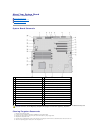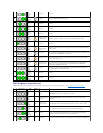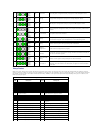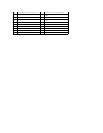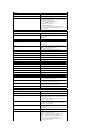
About Memory
DellPrecision™T5500ServiceManual
Memory Modules
Supported Memory Configurations
Memory Subsystem
Memory Slots
Memory Population Rules
Your computer uses 1066 MHz and 1333Mhz DDR3 unbuffered or registered ECC SDRAM memory. DDR3 SDRAM, or double-data-rate three synchronous
dynamic random access memory, is a random access memory technology. It is a part of the SDRAM family of technologies, which is one of many DRAM (dynamic
random access memory) implementations, and is an evolutionary improvement over its predecessor, DDR2 SDRAM.
The primary benefit of DDR3 SDRAM is its ability to run its I/O bus at four times the speed of the memory cells it contains, thus enabling faster bus speeds and
higher peak throughputs than earlier technologies. This is achieved at the cost of higher latency. Also, the DDR3 standard allows for chip capacities of 512
megabit to 8 gigabit, effectively enabling memory modules of maximum 16 gigabyte in size.
DDR3 memory comes with a promise of a power consumption reduction of 30% compared to current commercial DDR2 modules due to DDR3’s 1.5 V supply
voltage. This supply voltage works well with the 90 nm fabrication technology used for most DDR3 chips. Some manufacturers further propose to use "dual-
gate" transistors to reduce leakage of current.
The main benefit of DDR3 comes from the higher bandwidth made possible by DDR3’s 8 bit deep prefetch buffer, whereas DDR2’s is 4 bits, and DDR’s is 2 bits
deep.
Memory Modules
Supported Memory Configurations
WARNING: Before working inside your computer, read the safety information that shipped with your computer. For additional safety best
practices information, see the Regulatory Compliance Homepage at www.dell.com/regulatory_compliance.
Standard name
Memory clock
Cycle time
I/O Bus clock
Data transfers per second
Module name
Peak transfer rate
DDR3-1066
133 MHz
7.5 ns
533 MHz
1066 Million
PC3-8500
8533 MB/s
DDR3-1333
166 MHz
6 ns
667 MHz
1333 Million
PC3-10600
10667 MB/s
Single Processor Memory Configurations
Size
(GB)
DIMM
Ranks
DIMM1
DIMM2
DIMM3
DIMM4
DIMM5
DIMM6
3
SR
1 GB
1 GB
1 GB
4
SR
1 GB
1 GB
1 GB
1 GB
4
MR
2 GB
1 GB
1 GB
8
MR
2 GB
2 GB
2 GB
1 GB
1 GB
12
SR
2 GB
2 GB
2 GB
2 GB
2 GB
2 GB
12
DR
4 GB
4 GB
4 GB
24
DR
4 GB
4 GB
4 GB
4 GB
4 GB
4 GB
24
DR
8 GB
8 GB
8 GB
32
MR
8 GB
8 GB
4 GB
4 GB
4 GB
4 GB
48
DR
8 GB
8 GB
8 GB
8 GB
8 GB
8 GB
Dual CPU Memory Configurations
Size
(GB)
DIMM
Ranks
MB DIMM1
MB DIMM2
MB DIMM3
MB DIMM4
MB DIMM5
MB DIMM6
Riser DIMM1
Riser DIMM2
Riser DIMM3
3
SR
1 GB
1 GB
1 GB
4
SR
1 GB
1 GB
1 GB
1 GB
6
SR
1 GB
1 GB
1 GB
1 GB
1 GB
1 GB
8
MR
2 GB
1 GB
1 GB
2 GB
1 GB
1 GB
12
SR
2 GB
2 GB
2 GB
2 GB
2 GB
2 GB
24
DR
4 GB
4 GB
4 GB
4 GB
4 GB
4 GB
24
MR
2 GB
2 GB
2 GB
2 GB
2 GB
2 GB
4 GB
4 GB
4 GB
48
DR
8 GB
8 GB
8 GB
8 GB
8 GB
8 GB
48
MR
4 GB
4 GB
4 GB
4 GB
4 GB
4 GB
8 GB
8 GB
8 GB
64
MR
8 GB
8 GB
8 GB
8 GB
4 GB
4 GB
8 GB
8 GB
8 GB







